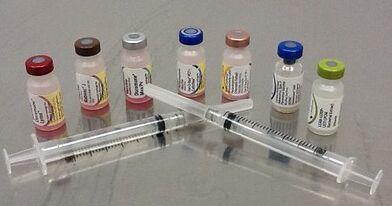Vaccinations
Vaccines protect against highly contagious and often life-threatening disease- some of which are zoonotic (diseases humans can get from our pets).
However, please note that NOT ALL pets will benefit from ALL vaccines.
Vaccination is a medical procedure that has many benefits but can also have some risk. Our doctors will discuss the options with you so that, together, you can make the best choices to protect your pet. Our clinic is proud to use highly purified vaccines designed to be delivered in half the volume of typical vaccines. Vaccines that may be discussed with you may include:
However, please note that NOT ALL pets will benefit from ALL vaccines.
Vaccination is a medical procedure that has many benefits but can also have some risk. Our doctors will discuss the options with you so that, together, you can make the best choices to protect your pet. Our clinic is proud to use highly purified vaccines designed to be delivered in half the volume of typical vaccines. Vaccines that may be discussed with you may include:
- Rabies- this is a deadly neurological virus that affects any warm blooded animal including humans. There is no test for rabies without killing the animal and no successful treatment option once symptoms appear. While years of vaccination requirements have kept the occurence of rabies to a minimum in our pets, rabies is still common in the wildlife population. Rabies vaccine is required by law.
- Canine Distemper-Parvovirus combination- includes distemper (respiratory and neurologic virus), adenovirus (liver disease causing virus), and parvo (deadly intestinal virus). Distemper-parvo vaccine is consider a "core vaccine"- meaning that all dogs can benefit from protection against these viruses.
- Leptospirosis- often included inside Distemper-parvo combinations or may be given separately. Leptospirosis is spread in the urine of wildlife. Dogs become exposed by drinking from a puddle / swimming in contaminated water / walking through infected grass. This bacteria can cause liver and kidney disease and be transmitted from dogs to people. Recent testing of raccoons in Illinois showed that 50% of these animals carried leptospirosis- due to this high number, our clinic considers leptospirosis a core vaccine.
- Lyme vaccine- protects against Lyme disease causing bacteria spread by ticks. Lyme is considered a "non core vaccine"- it is not needed by all pets, just those that are at risk for being bitten by ticks. If you have found ticks on your pets or yourself or if your pet visits wooded or grassy areas, you should consider lyme vaccination. FYI- tick prevention products alone are NOT sufficient to protect against lyme disease because no preventative product is 100% protective all the time.
- Bordetella vaccine- protects against an upper respiratory infection that is transmitted through the air or contaminated objects. Pets at risk include those that visit: grooming parlors, boarding facilities, kennels, pet friendly stores, dog parks, training classes, or other places where pets congregate.
- Canine Influenza Vaccine- helps provide faster immune response if a dog is exposed to Canine Influenza or "dog flu" virus. While this vaccine is not 100% effective in preventing illness, it has shown to help provide protection against the more serious symptoms of Dog Flu such as pneumonia. For more information on this new vaccine, visit the "Pet Info" tab above.
- Feline Distemper vaccine- this is a combination vaccine that protects against two airborne upper respiratory viruses and one intestinal virus (similar to parvo in dogs). Even indoor cats can benefit from this core vaccine.
- Feline Leukemia vaccine- this is a virus spread in bodily fluids when cats groom or bite each other, for example. Leukemia virus affects a cat's immune system and predisposes to cancer at young ages; greatly shortening expected life span. Kittens and cats that go outdoors are at most risk for leukemia virus and should be vaccinated. Leukemia vaccine may not be necessary for adult indoor only cats in a stable environment.
What about vaccine reactions?
Vaccination is much more than "just a shot"! Vaccination is a medical procedure designed to stimulate the immune system - with this stimulation comes possible side effects.
After vaccination, it is very normal for pets to possibly experience: soreness at the injection site, mild fever, lethargy, or reduced appetite. Some pets may exhibit no symptoms after vaccination. Typically, symptoms resolve on their own without the need for treatment after 24 to 48 hours. If you observe these symptoms and are concerned - please discuss with your veterinarian what can be done.
Occasionally, the body's vaccine response can be extreme. As vaccine technology has advanced, these extreme reactions are more and more rare, but it is important to know when to take action. If your pet experiences: vomiting or diarrhea, facial swelling, hives, or weakness within a few hours of vaccination, you should seek veterinary care immediately.
Vaccination is much more than "just a shot"! Vaccination is a medical procedure designed to stimulate the immune system - with this stimulation comes possible side effects.
After vaccination, it is very normal for pets to possibly experience: soreness at the injection site, mild fever, lethargy, or reduced appetite. Some pets may exhibit no symptoms after vaccination. Typically, symptoms resolve on their own without the need for treatment after 24 to 48 hours. If you observe these symptoms and are concerned - please discuss with your veterinarian what can be done.
Occasionally, the body's vaccine response can be extreme. As vaccine technology has advanced, these extreme reactions are more and more rare, but it is important to know when to take action. If your pet experiences: vomiting or diarrhea, facial swelling, hives, or weakness within a few hours of vaccination, you should seek veterinary care immediately.

